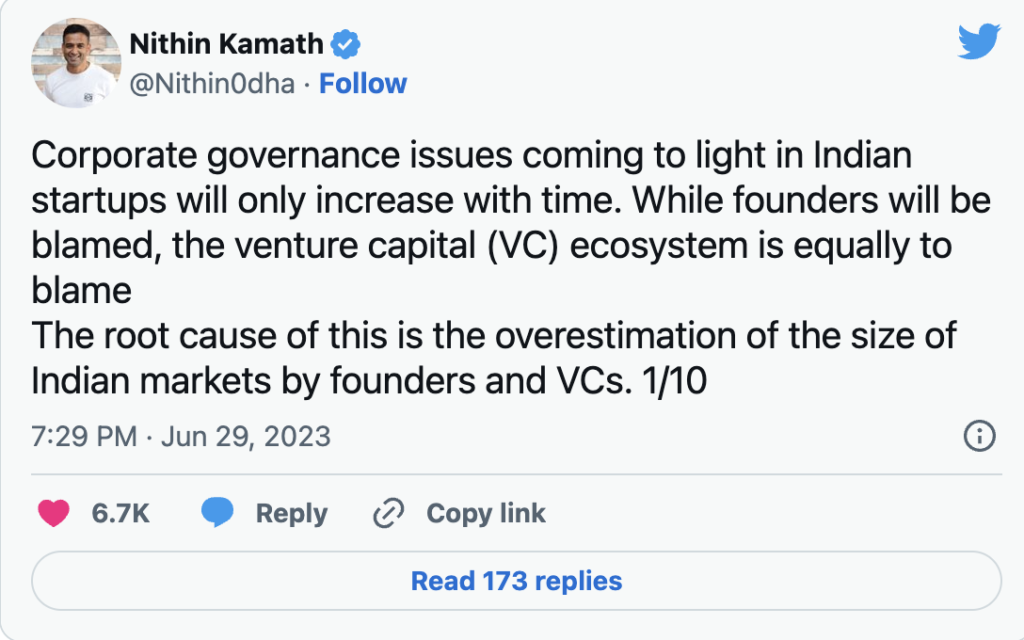June 30, 2023 – In a series of tweets, Nithin Kamath, the Founder and CEO of Zerodha, shared his perspective on the growing concerns surrounding corporate governance in Indian startups. Kamath believes that these issues will only exacerbate over time and highlights the shared responsibility of both founders and venture capitalists (VCs).
Kamath expressed, “While founders will be blamed, the venture capital (VC) ecosystem is equally to blame. The root cause of this is the overestimation of the size of Indian markets by founders and VCs.” He emphasized that although India is a rapidly growing economy with the potential to become an economic superpower, it has not reached that status yet. Kamath stated in one of his tweets, “The size of the target market (TAM) by revenue needs to increase significantly to justify the valuations of the startup ecosystem in the country.”
According to Kamath, many VCs have miscalculated this aspect and may have oversold the India opportunity to their limited partners (LPs). He claimed that achieving large exits within a seven-year fund lifecycle, the timeframe within which founders are expected to produce exits, is challenging in a “small market like ours” with limited merger and acquisition (M&A) opportunities.
Kamath argued that building a robust business in India takes time and cited the scarcity of examples where it has been done in under ten years. “How can anyone build a good business if VC funds have seven-year lifecycles and push startups for exits within seven years? Perhaps India’s fund lifecycles should be longer,” he speculated.
The founder further pointed out that founders have to align their story with what the VC industry is selling to their limited partners (LPs) in order to secure funding. Kamath expressed his concerns about the unrealistic projections made by some startups in their pitch decks, stating, “I’ve seen so many startups get funding whose pitch decks were practically delusional. VCs should help correct this in an ideal world, not fuel the delusion.”
Kamath shared an example where startups claimed that 30-50 crore (300-500 million) Indians would be investing by 2027, with the expectation to capture over 10% of that market. He found this projection unrealistic, especially considering that at the time, only around 6 crore (60 million) Indians were filing income tax returns. Kamath questioned why these claims were not scrutinized more rigorously before funding was provided.
Summing up the root cause of the issue, Kamath said, “Believing in a TAM (total addressable market) that isn’t there yet and then burning out by chasing it.” He predicts that most governance issues in the future will not involve typical fraud but rather the manipulation of information to support exaggerated narratives used to raise capital. Kamath stressed that both founders and the VC ecosystem that fueled this culture are to blame.
In Kamath’s view, India requires a steady and continuous flow of capital, rather than sporadic bursts, to become an economic superpower. He emphasised that building or investing in businesses with unrealistic expectations can lead to false narratives and impede the smooth flow of capital, thereby reducing the likelihood of India achieving its full potential.

Readmore:
Lumikai Announces $50 Million Launch of Second Gaming VC Fund
To get more updates, Follow us on Facebook, Twitter, Instagram and LinkedIn


